‘I don’t want to be forgotten’: Lower East Side street corner named after housing activist Frances Goldin
New York City celebrated a trailblazing housing and social justice advocate last week by co-naming the northeast corner of East 4th Street and Cooper Square "Frances Goldin Way." Read More
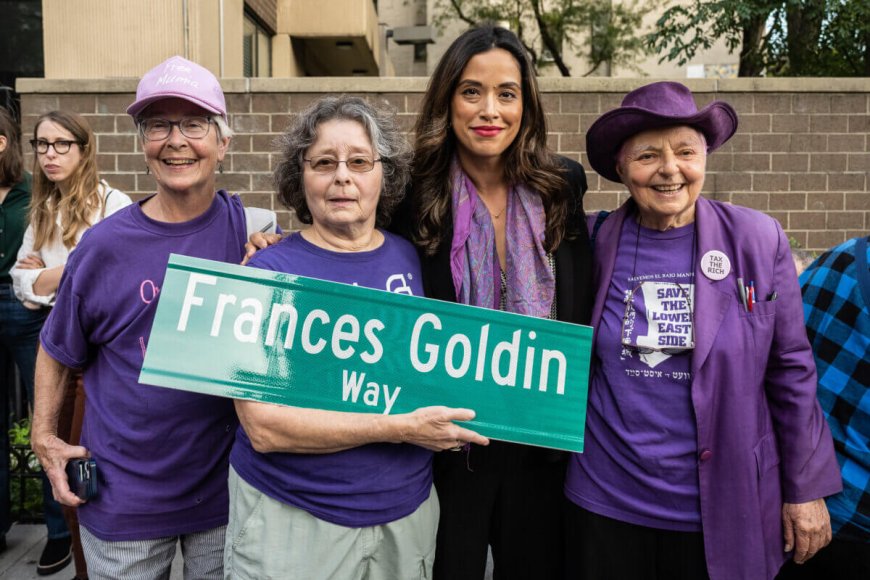
New York City celebrated a trailblazing housing and social justice advocate last week by co-naming the northeast corner of East 4th Street and Cooper Square “Frances Goldin Way.”
Goldin was remembered at the Oct. 5 ceremony as funny, outspoken, high energy and a great cook. Friends and family called her a “hoot” with an affinity for wearing purple — from her hair down to her underwear.
The charismatic character made her mark in the late 50s, when she successfully fought against Robert Moses’ plan to bulldoze a twelve-stretch block of historic and affordable housing in the Lower East Side to build a cross-Manhattan Expressway.
Goldin was the mother of two lesbian daughters, Reeni and Sally, and a staunch ally of the LGBTQI+ community. She was a fixture at the annual Gay Pride Parade, carrying her trademark sign that read, “I Adore My Lesbian Daughters – Keep Them Safe.”
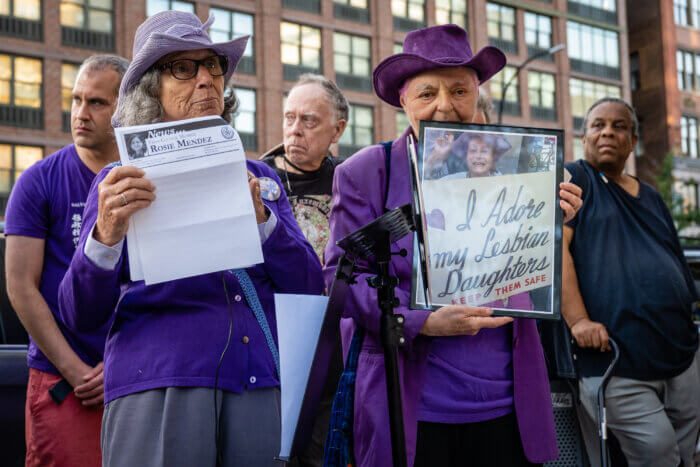
Reeni recalled that towards the end of her life, her mother, who passed away at 95 on May 16, 2020, said she didn’t want to be forgotten. This month, she got her wish.
“How can she be forgotten? She’s got a street named after her,” Reeni said.
Addressing the crowd, many clad in Goldin’s signature color purple and wearing her buttons, Reeni pointed out that her mother also had a building named after her, the Frances Goldin Senior Apartments at Essex Crossing, built on the Seward Park Urban Renewal Area site. Because of political power-play, the eight-square block of land sat vacant for 50 years after thousands of low-income tenants were displaced in the 1950s and 1960s. Goldin was instrumental in the negotiations to include low- and middle-income housing and give preference to displaced families.
“She would never be forgotten,” Reeni said. “That building is going to outlast all of us.”
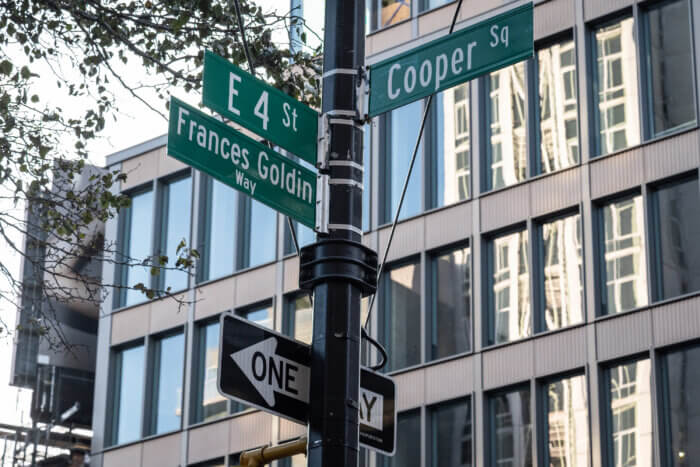
Reeni said her mother organized, lobbied, and fought for justice and equality for 75 years and shared that a few months before Frances Goldin’s death, she told her caregiver Joan, “I may be wrong. But I believe that if you fight strongly for your principles, you will win. But if you’re weak and give in, you will lose. You’ll have to fight for your beliefs and never give up. And then the world will be a better place for you and me.”
Goldin was the founding member of the Metropolitan Council on Housing and the Cooper Square Committee. In 1977, Goldin founded the Frances Goldin Literary Agency, representing feminist, racial justice, LGTBQ, and social justice literary voices like Dorothy Allison, Staceyann Chin, Mike Wallace, Edwin G. Burrows, Edwin G. Burrows, and Barbara Kingsolver.
Sam Stoloff, president and senior agent at Frances Goldin Literary Agency, said he’d known Francis Goldin since he was 14.
Stoloff said that Goldin’s “day job” as a literary agent was deeply rooted in her work as a community activist, shining a light on racist redlining, the government’s cover-up of the toxic air in lower Manhattan after 9/11, and Rudy Giuliani’s “Broken Windows” policy. “Gotham: A History of New York City to 1898” by Edwin G. Burrows and Mike Wallace garnered a Pulitzer Prize for History in 1999.
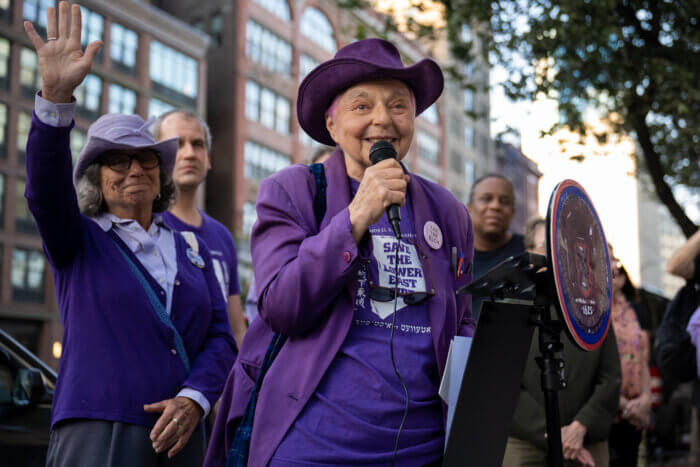
“As an organizer, she fought against the real estate developers,” Stoloff said. “And as an agent, she represented the first book exposing Donald Trump as a real estate racketeer by the great Village Voice investigative journalist Wayne Barrett.”
Joyce Ravitz, chair and president of the Cooper Square Committee, was friends with Goldin for over 50 years. Ravitz said Goldin was the first adult she met who wasn’t afraid of change and embraced it.
“I had no idea 50-odd years ago that that woman was going to change my life,” Ravitz said. “I would become her mentee like many people here today.”
Lisa Kaplan said Francis Goldin “was undoubtedly the most exceptional person” she had ever known, and to name the street corner the “Francis Goldin Way” was only appropriate because Goldin “had a way” to fight injustice and create a “better world.”
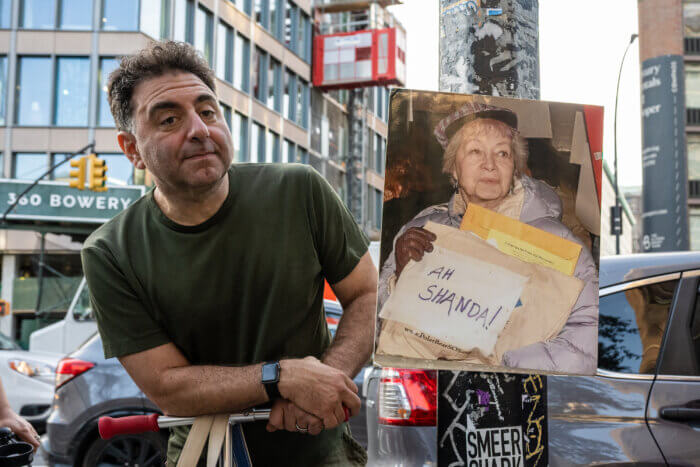
“She was a compassionate fighter who did not turn her back on any cause that needed to be addressed,” Kaplan said. “She made an outsized impact on the city, this community, and specifically on this block.”
New York City Council Member Carlina Rivera said that Frances Goldin’s legacy and contributions to New York City rightfully earned her a permanent place in the city’s history.
“Between the Met Council, between being this amazing literary agent, she was a rabble-rouser to the fullest, as we say in the LES,” Rivera said.

 Mark
Mark 





